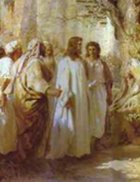Ancient Perceptions of God

.... In the ancient world, God was making Himself known to a chosen people, the Jews. Their chief advantage was that He had committed His oracles to them, which we know today as the Scriptures (Romans 3:2). In them, all knowledge was perfect and certain vital truths about God Himself were revealed. But in the world beyond this nation, paganism prevailed.
.... The Gentiles were strangers from the covenants of promise and without God in the world (Ephesians 2:12). Nevertheless they were spiritually inquisitive, so in this dark vacuum they developed pagan religions of their own. Often, an entire caste system of gods and goddesses would emerge. For example, there might have been a god of fire, of air or of water; there might have been a god of war and a goddess of jealousy. There would be good gods and bad gods; there would be good goddesses and bad goddesses. That’s how their basic logic ran. But one other feature became very common among their beliefs, even in different parts of the world: at the top of their caste systems, many of them envisioned a ruling triumvirate of three ‘super’ gods. Let’s taking Greek mythology as our most familiar example:
.... Within the caste system of Greek mythology there were hundreds, perhaps thousands, of so-called ‘gods’. But at the top of their caste system, Zeus, Aries and Hermes stood above the rest. In the logic of Greek thinking, they governed together in a triumvirate, ruling over the other gods and goddesses and also over the fate of man.
.
.... The same, basic concept was common in pagan religions throughout the world. The Egyptians, for instance, worshiped Horace, Isis and Osiris, who likewise formed a triumvirate over the other gods and goddesses, and who ruled over the affairs of man.
.... Or perhaps, in some societies, the Sun, the Moon and the planet Venus, the brightest of the heavenly bodies, would appear as a governing triumvirate. Whether it was the Egyptians, the Greeks, the Babylonians, the Romans, Europeans, Indians, or Southeast Asians – no matter who or where it was, it was fairly common to envision a ruling triumvirate of three ‘super gods’ who were several notches higher than the others, who ruled the other gods and goddesses and who also ruled over the fate of mankind.
.... Now the Bible recognizes that this sort of Gentile thinking was out there in the world, and God has something to say about it. Colossians 2:8 tells us that it is the tradition of men, according to the basic principle of this world, and not according to Christ. So the Bible recognizes that such thoughts are out there, and tells us they are wrong. It’s not according to Christ; it does not portray Him in truth.
.... As you will see, the opponents of the Doctrine of the Trinity are very familiar with the historical concept we’ve just described. And in misapplying it, they’re going to say something like this:
.... "See? The Doctrine of the Trinity – that the Father, Son and Holy Ghost rule together as one – that concept has it’s roots in paganism. That doctrine is something that some backslidden church from the second century adopted because they didn’t want to offend the superstitions of the ignorant people."
.... Okay – you’ll see – when you run across an opponent of the Trinity, they are bound to bring this up and they’re going to make the point that I just said they’d make about it.
















0 Comments:
Post a Comment
<< Home